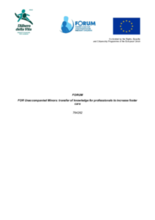Displaying 31 - 40 of 48
This article is written as part of the FORUM project (FOR Unaccompanied Minors: transfer of knowledge for professionals to increase foster care), an EU funded project which sought to enhance the capacity of professionals to provide quality foster care for unaccompanied migrant children, primarily through the transfer of knowledge. The article aims to contribute to this transfer of knowledge by bringing together literature which is of relevance to professionals developing or enhancing foster care services for unaccompanied migrant children.
The European Scientific Association on Residential & Family Care for Children and Adolescents Conference will be held in Porto, Portugal from 2nd to 5th October 2018.
This study evaluated the psychometric properties of a Portuguese version of the Compass of Shame Scale using an adolescent sample, to investigate if its internal structure was valid for diverse adolescent subsamples, and to gather evidence on the construct validity of the instrument.
An important goal of out of home care is to prepare the family and child for reunification. Practitioners are often required to make the decision whether to reunify a foster child with their biological family. This study examines this complex reunification decision in Portugal.
The main goals of this study from the Special Issue on Adoption Breakdown of the journal of Research on Social Work Practice were to determine the incidence of preadoption breakdown in Portugal, describe preadoptive parents’ reasons for ending placement, compare intact/disrupted placements, and identify adoption disruption risk and protective factors.
This is a pilot study on the sensitive issue of how children and young people experience family contact in foster care, and the views of key adults in their lives on the same issue.
This quantitative study contributes knowledge regarding the attitude of professionals towards positive parenting and child participation.
This study aimed to test the impact of parents' evaluation of expectations on their child's behavioral problem by investigating a sequential mediation effect of parenting stress and parental satisfaction.
This research aims to contribute to a deeper visibility of the care phenomena, giving specific attention to the foster families themselves.
This paper explores practical and ethical dilemmas for professionals when securing the protection of children in the complex non‐clinical setting of individual families.

